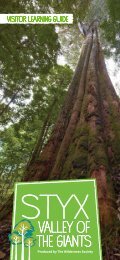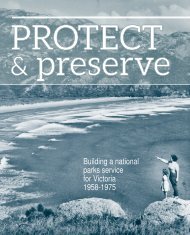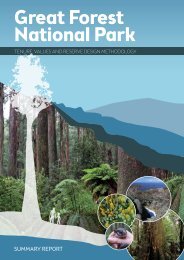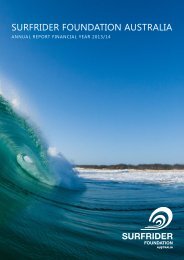EXPLORING VICTORIA’S NATIONAL PARKS
Victoria's national parks are open to everyone, 24 hours a day, 365 days a year, so it's not surprising they attract 35 million visitors annually. Many parks have facilities and special tracks for people who are less mobile or need a wheelchair, and in some parks there are even all-terrain wheelchairs available. And while our parks are open for all Victorians to enjoy they also exist as the only way to give long-term protection to our native plants and animals by protecting the places in which they live.
Victoria's national parks are open to everyone, 24 hours a day, 365 days a year, so it's not surprising they attract 35 million visitors annually.
Many parks have facilities and special tracks for people who are less mobile or need a wheelchair, and in some parks there are even all-terrain wheelchairs available.
And while our parks are open for all Victorians to enjoy they also exist as the only way to give long-term protection to our native plants and animals by protecting the places in which they live.
Create successful ePaper yourself
Turn your PDF publications into a flip-book with our unique Google optimized e-Paper software.
Q. IS HORSE RIDING ALLOWED IN<br />
<strong>NATIONAL</strong> <strong>PARKS</strong>?<br />
Yes, in many parks, but they<br />
are usually on designated<br />
routes to best protect the<br />
environment and avoid clashes<br />
with other users.<br />
National park management plans<br />
determine the location of horse<br />
trails to reduce conflict between<br />
different parks users, reduce<br />
potential environmental impacts<br />
and maximise experiences.<br />
Regulations about horse riding,<br />
including where you can ride a<br />
horse, vary from park to park. It<br />
is best to speak to the local park<br />
office to make sure you are doing<br />
the right thing, and also getting<br />
the most from your visit. You can<br />
be connected free of charge to any<br />
Parks Victoria office on 131 963.<br />
Some important things<br />
to know are:<br />
• If in doubt about availability of<br />
access or permit requirements,<br />
check with the responsible land<br />
manager.<br />
• Respect the rights of other visitors.<br />
You will meet walkers and others<br />
unfamiliar with horses and unsure<br />
about passing them on the track.<br />
Ensure all horses in your party<br />
are walking quietly when passing<br />
other users on a track.<br />
• Stay on the road or designated<br />
horse trials. Do not ride ‘off-road’<br />
or on tracks closed to horses as<br />
you may damage the environment<br />
you have come to enjoy.<br />
• When riding, be prepared for the<br />
unexpected. Timber trucks, 4WDs,<br />
hikers, cyclists and native animals<br />
may also be using your chosen<br />
track.<br />
Parks where horse riding is<br />
allowed include:<br />
• Baw Baw National Park<br />
• Bunyip State Park<br />
• Dandenong Ranges National Park<br />
• Enfield State Park<br />
• Hepburn Regional Park<br />
• Kooyoora State Park<br />
• Macedon Regional Park<br />
• Mornington Peninsula National Park<br />
• Before leaving on a trip, check<br />
road conditions. Do not use roads<br />
and tracks when they are wet or<br />
likely to be damaged.<br />
• Be safety conscious – plan your<br />
trip carefully, carry a first aid kit,<br />
maintain your saddlery equipment<br />
and be fully equipped. Leave<br />
details of your proposed trip with<br />
a responsible person.<br />
• Hold horses at least 30 metres<br />
from streams, huts and camping<br />
areas unless otherwise directed<br />
by departmental staff. Use<br />
hitching rails or other holding<br />
facilities where provided. Avoid<br />
damage to vegetation when<br />
tethering. Do not tie horses to<br />
small limbs and shrubs. Tethering<br />
directly to trees overnight is<br />
prohibited because it causes<br />
unacceptable ground damage –<br />
use hobbles or a ground tether<br />
instead.<br />
• Horses retain weed seeds in<br />
their gut which can germinate<br />
in manure in the forest. Your<br />
horse should be fed with clean<br />
feed (ie. commercial cracked<br />
grain, proprietary and processed<br />
feeds) for at least 48 hours before<br />
entering a park or other natural<br />
area. Feed your horse with a nose<br />
• Warrandyte State Park<br />
• You Yangs Regional Park<br />
• Kinglake National Park.<br />
Horse riding and horse camps are<br />
allowed in:<br />
• Alpine National Park<br />
• Cobboboonee National Park<br />
• Howqua Hills Historic Area<br />
• Kurth Kiln Regional Park.<br />
bag – do not spread feed on the<br />
ground.<br />
• Where horse camping is allowed<br />
camp only in a designated horse<br />
campsite and keep at least<br />
30 metres from watercourses.<br />
• Avoid crossing areas easily<br />
damaged by horses such as<br />
swamps and steep or boggy creek<br />
crossings.<br />
• Horses should be watered<br />
downstream from camping areas.<br />
To avoid stream bank erosion,<br />
bucket water to horses.<br />
• Do not wash yourself or your<br />
horse in streams. Carry water<br />
to your camp for all washing<br />
purposes, including washing<br />
horses, and scatter wash water<br />
well away from streams.<br />
• Report fallen trees or limbs across<br />
roads to the nearest Department<br />
of Environment, Land, Water and<br />
Planning office (for state forest) or<br />
Parks Victoria office (for parks and<br />
reserves).<br />
• Leave no trace. Take all rubbish<br />
home.<br />
• Take care with fire – observe all<br />
fire regulations and Total Fire Ban<br />
days.<br />
YOUR QUESTIONS ANSWERED 19







